Iran's Leader Hails Soleimani's Role In ‘Revitalizing’ Resistance
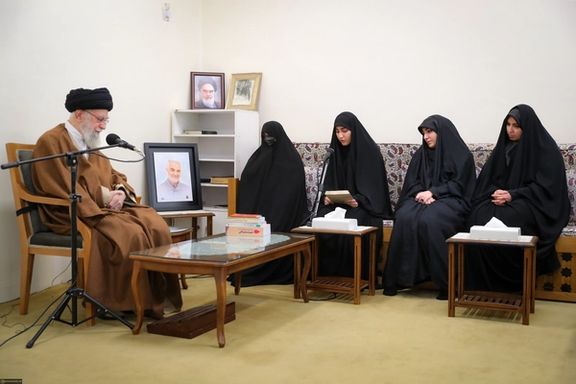
Iran's Supreme Leader praised the legacy of the slain Quds Force commander Qasem Soleimani in a meeting with his family.

Iran's Supreme Leader praised the legacy of the slain Quds Force commander Qasem Soleimani in a meeting with his family.
Ali Khameini said Soleimani, killed in a US drone strike in Iraq in 2020, had boosted the regime's “resistance front” in the region, referring to Iran's proxies and their military actions in the region.
During the Sunday meeting, the Supreme Leader attributed the recent “resilience of Gaza” to the existence of the “resistance front”, consisting of proxies in countries including Lebanon, Iraq, Syria and Yemen, all of which receive huge financial and military aid from Tehran.
On October 7, Iran-backed Hamas in Gaza invaded Israel, killing 1,200 mostly civilians. It has resulted in a relentless assault from Israel in retaliation as the country vows to eradicate the Gaza militia.
While the regime celebrates the Hamas attack and claims it is a victory over the Jewish state, almost 70% of Gaza's 439,000 homes and about half of its buildings have been damaged or destroyed in retaliation.
According to the UN, an estimated 1.9 million Gazans have been displaced, seeking refuge in shelters or makeshift tents in the winter cold as the conflict continues to intensify.
Soleimani had been accused by then-President Donald Trump of actively planning attacks on American diplomats and service members, and he was instrumental in supporting and organizing militant proxy forces, including Lebanese Hezbollah and Iraqi Shiite militia groups.
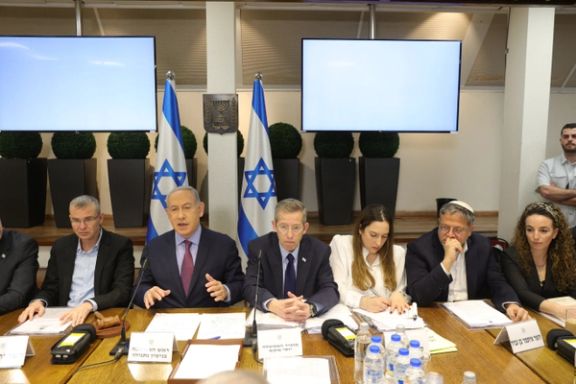
The Israeli prime minister declared his ongoing commitment to ensuring that Iran does not gain nuclear weapons amid the ongoing war in Gaza.
"We are acting against Iran all the time, everywhere, and I will not go into details. Today, everyone understands that the threat from Iran will greatly increase if Iran has nuclear weapons," Benjamin Netanyahu said in his address on Saturday night.
"Therefore, the goal that I have been working toward for many years, even now, remains as is: To do absolutely everything to prevent Iran from obtaining nuclear weapons."
The IAEA announced last week that Iran has reversed a months-long slowdown in the rate at which it is enriching uranium to up to 60% purity, close to weapons grade. While Iran already has enough uranium enriched to up to 60%, if it continues to enrich, it will have the capacity to make three nuclear bombs, and more at lower enrichment levels.
Netanyahu also addressed the situation with Iran's Yemeni proxy, the Houthis, which has been targeting vessels in the Red Sea in a bid to pressure Israel to cease its retaliatory attacks on Gaza following the October 7 Hamas invasion. On the day now known as Black Sabbath, Hamas killed 1,200 mostly civilians and took at least 240 more hostage. Since Israel launched its retaliation, Hamas claims at least 21,000 Gazans have died.
Netanyahu praised the US-led international coalition formed to combat the martimite threat, the route responsible for 12 percent of global trade. "I spoke with many leaders about the need to form an international coalition to safeguard freedom of international navigation in the straits. I welcome the fact that such a coalition has been formed. In any case, we will not allow this threat to harm the citizens of Israel or the Israeli economy," he said.
Providing an update on the ongoing conflict against the Iran-backed Hamas terror group, Netanyahu acknowledged the continuation of the war on all fronts.
"We have eliminated over 8,000 terrorists, and we are eliminating many more each day of fighting. Step by step, we are wiping out Hamas's capabilities. Hamas will be defeated. Our soldiers will win. The people of Israel will win," he said, amid a war which has now spread to Israel's north with Hezbollah in Lebanon increasing its bombardments.
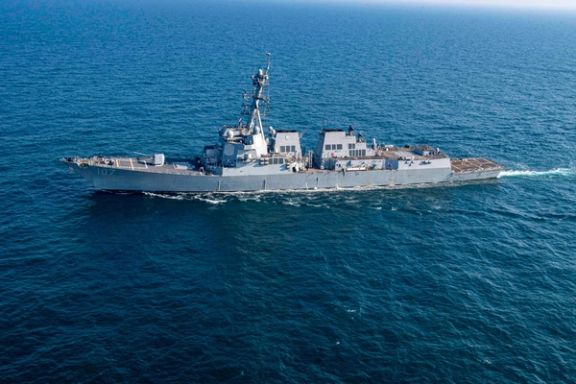
As Red Sea tensions rise, the US sank three Houthi boats on Sunday foiling a ship hijacking attempt, but Tehran vowed continued support for its militant proxies.
Two distress signals were sent out by the MAERSK Hangzhou within 24 hours, the first signalling a hit by a missile, and the second, indicating a hijacking attempt.
As the attack was unfolding, Iran’s Supreme Leader Ali Khamenei in Tehran said that the Islamic Republic should continue its support for the “Resistance Front”, referring to the regime’s proxy.
US Centcom said the attack marked the 23rd instance of aggression against international shipping since November 19.
With well over 100 attacks on US facilities in the Middle East since the Gaza war broke out on October 7, sparked by Hamas’s invasion of Israel, it is a rare action from the US which until now, has tried to avoid military clashes.
Following the Israeli military operation in Gaza, Iran’s Yemeni proxy announced it would be joining the war on Israel, targeting shipping in the Red Sea and surrounding area.
Attempting to force Israel to agree to a full ceasefire, missiles and drones have been targeting Israeli soil as well as international shipping and US interests. Following the US support of Israel’s right to defend itself in the wake of the October 7 attacks, which saw 1,200 mostly civilians murdered and 240 or more taken hostage, the US has come under further attacks in Iraq and Syria.
The escalation in the maritime route which accounts for around 12 percent of global trade and oil, connecting Asia to Europe, has led the US to form a more than 20-member international coalition in the face of the aggression, Operation Prosperity Guardian. Several shipping companies have either ceased activity or take longer routes, causing major delays and costs to journeys.
Denmark, the owner/operator of the latest targeted vessel, is the newest member of the coalition, though due to the sensitivity of the region, not all countries have openly stated membership.
Following the initial strike on the Singapore-flagged container ship which claimed it had been hit by a missile, the US Navy shot down two anti-ship ballistic missiles. No injuries were reported and the ship was still seaworthy.
But later, in the early hours of Sunday morning, a second distress call revealed four Houthi small boats attempting to hijack the ship, as they fired with small arms at the ship, getting to within 20 meters and attempting to board.
“A contract embarked security team on the MAERSK Hangzhou returned fire. US helicopters from the USS EISENHOWER (CVN 69) and GRAVELY (DDG 107) responded to the distress call and in the process of issuing verbal calls to the small boats, the small boats fired upon the US helicopters with crew served weapons and small arms,” the statement said.
“The US Navy helicopters returned fire in self-defence, sinking three of the four small boats, and killing the crews. The fourth boat fled the area. There was no damage to US personnel or equipment.”
Holding Iran accountable, British Foreign Secretary David Cameron said on Sunday that he had told Iranian Foreign Minister Hossein Amir-Abdollahian in a call that Iran should help stop the Houthi attacks in the Red Sea.
"I made clear that Iran shares responsibility for preventing these attacks, given their long-standing support to the Houthis," Cameron said in a X, adding that the attacks "threaten innocent lives and the global economy”.
Iran expert Jason Brodsky, said the latest US action was “a step in the right direction” in terms of deterrence but said “without more decisive action including against the IRGC, it won't alter the fundamentals of the deterrence deficit in the Red Sea”.
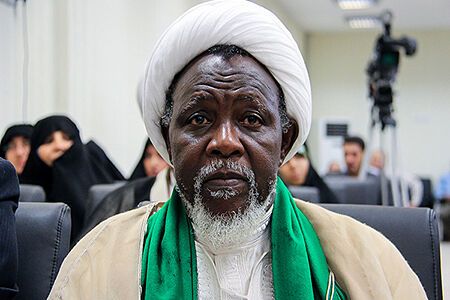
The leader of the Islamic Movement in Nigeria says Africa must draw inspiration from Iran's Islamic Revolution.
Sheikh Ibrahim Zakzaky, currently in Iran, said in a recent meeting with Alireza Araafi, the director of religious seminaries in Iran, that “the Islamic Revolution continues under the leadership of Ali Khamenei.”
During a meeting held in October, Iran's Supreme Leader Ali Khamenei conveyed to Sheikh Ibrahim Zakzaky that "The Islamic Movement is expanding in Africa, Europe, and North America," mobilizing the global Shiite population.
Zakzaky, often referred to as Nigeria's Ayatollah, leads the Islamic Movement in Nigeria, a movement inspired by the Iranian Revolution, rejecting the authority of the Nigerian government. He currently faces imprisonment on multiple charges, including murder, culpable homicide, unlawful assembly, and disruption of public peace, as the government seeks to suppress the revolutionary movement.
Expressing support for Zakzaky's efforts to expand Shiite Islam in Nigeria, where approximately 50 percent of the population is Muslim, primarily Sunni, Khamenei acknowledged Iran's backing of Nigeria's Islamic Movement. The support is evident in recent energy talks, focusing on cooperation to address energy challenges, while also seeking the Nigerian government's collaboration.
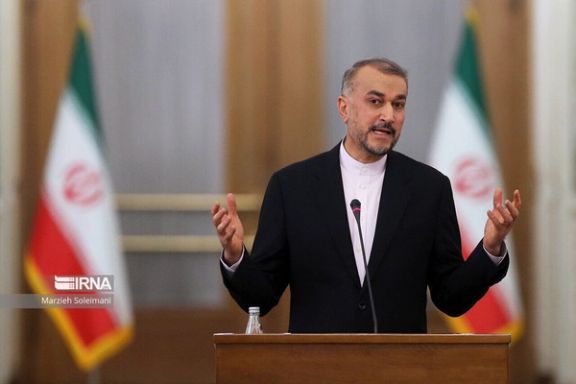
Iran's Foreign Minister criticized what he termed "coercive measures" employed by human rights institutions in their investigation of the 2022 protests.
In a meeting held in Tehran on Sunday, Hossein Amir-Abdollahian claimed that such measures “lack legal or legitimate justification".
In the wake of the unrest, the UN Human Rights Council initiated a fact-finding mission to probe the reported human rights violations in the aftermath of the widespread protests ignited in September following the death of Mahsa Amini in morality police custody.
Protesters were met with severe repression by Iranian authorities. Reports indicate the use of excessive and lethal force, over 500 killed and the arrest of tens of thousands of protesters and peaceful dissidents.
Amir-Abdollahian also claimed that a committee, led by President Ebrahim Raisi, has been established to investigate the 2022 protests. According to him, this committee signifies the "accountability and seriousness of the Islamic Republic in supporting human rights."
Human rights organizations are actively engaged in investigating the deaths of hundreds, including 69 children, during the protests. The primary focus of the investigations is to seek justice for victims and survivors of extrajudicial killings, mass arbitrary detentions, torture, and other serious abuses allegedly perpetrated by the Islamic Republic in response to peaceful demonstrations.
The lack of independence and impartiality in Iran's judicial system complicates domestic avenues for accountability, making it challenging to address alleged injustices and abuses within the country.
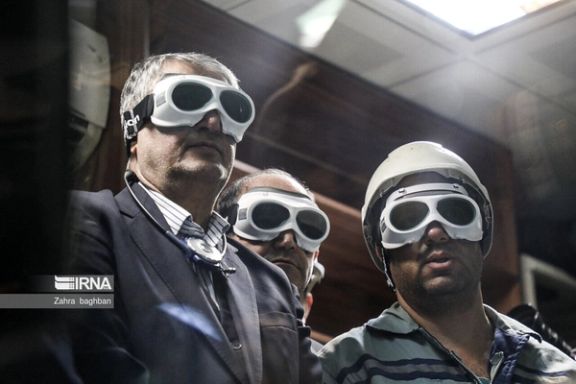
France’s ambassador to the United Nations is “extremely concerned” with Iran’s soaring uranium enrichment which he says has progressed at “dramatic rates”.
“The level of threat has increased a lot so it's time for Iran to get back to compliance and the IAEA reported on that on December 26, again, and documented the violations. So of course we are extremely concerned,” said Nicolas de Rivière in an interview with Iran International.
“We need things to go back on track and the sooner the better,” with the JCPOA nuclear agreement now collapsed. He says that the world is now at a “crossroads” as Iran violates the JCPOA nuclear agreement in “an absolutely massive manner” with enrichment at “unprecedented levels”.
The IAEA announced last week that Iran has reversed a months-long slowdown in the rate at which it is enriching uranium to up to 60% purity, close to weapons grade. While Iran already has enough uranium enriched to up to 60%, if it continues to enrich, it will have the capacity to make three nuclear bombs, and more at lower enrichment levels.
“The enrichment capacity of Iran has increased in a dramatic matter,” de Rivière said. “The so-called breakout time, which was the security deadlines provided by the JCPOA have pretty much disappeared and now Iran is pretty close to enough fissile material to assemble a nuclear device,” a situation he calls “extremely dangerous”.
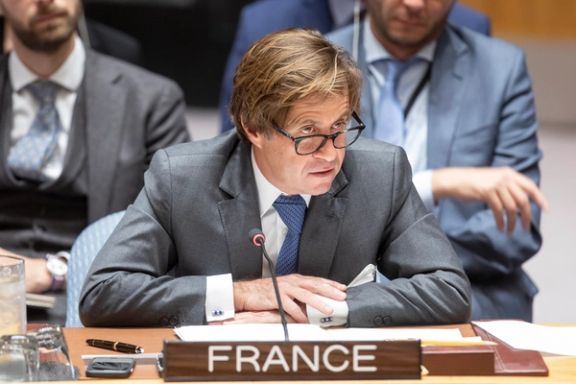
The US released a statement after the IAEA announcement which said the “findings represent a backwards step by Iran and will result in Iran tripling its monthly production rate of uranium enriched up to 60%”.
However, in keeping with the Biden administration line, the State Department said: “We remain committed to a diplomatic solution and reaffirm our determination that Iran must never develop a nuclear weapon.” Republicans believe a recent deal to free five US-Iranian hostages in return for freeing up $5bn in frozen Iranian funds has emboldened the regime.
De Rivière said the breakdown of the JCPOA and the latest revelations means “we are back to square one”. He said: “The level of the threat is extremely high and I think we should do whatever we can to convince Iran to change its course of action.”
“We should not give up with the talks. I think we should resume talks,” he said, explaining that the framework of the JCPOA itself works, but the need to resume cooperation is critical.
“We should certainly try to have another round of negotiations and see what is feasible. I think as a diplomat, you should never give up on the negotiating and trying to find a solution. So I think it's very late, but it's probably not too late.”
The E3, a coalition of the UK, France and Germany, immediately reacted to the latest IAEA news, calling it a “backwards step by Iran” which continues to deny its aims of nuclear weapons.
“The production of high-enriched uranium by Iran has no credible civilian justification and the reported production at the Fordow Fuel Enrichment Plant and the Pilot Fuel Enrichment Plant further carries significant proliferation-related risks,” the E3 said, calling the revelations “reckless behaviour in a tense regional context”.
While Iran-backed Hamas continues fighting Israel in the Gaza war, sparked by the Hamas massacre of 1,200 mostly civilians on October 7, de Rivière also spoke of the destabilizing activities of Iran’s proxies.
Its largest and most powerful proxy, Hezbollah, is also upping its attacks on Israel’s northern border, while the Yemeni Houthis have just carried out its 23rd attack on shipping in and around the Red Sea since October 19, threatening wider escalation.
The US is leading a more than 20-nation coalition to protect the maritime route, but de Rivière noted that Iran’s proxies are contributing to making the region “dangerous and unstable”.
“Whether with the Houthis or with the Iranian supported groups in Syria and Iraq, the sooner we can bring the crisis in Gaza under control the better because it will probably reduce the tensions in the whole region,” he said, France “very concerned with the risk of spillover of the crisis in Gaza in the whole region”.
France continues to warn the regime not to inflame the tensions further, de Rivière said. “We speak to the Iranians on a regular basis and this is precisely the message we put to the Iranians, don't mix up with this [Gaza] crisis.”